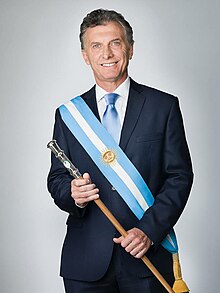Mauricio Macri
Mauricio Macri (Spanish pronunciation: [mauˈɾisjo ˈmakɾi]; born 8 February 1959) is an Argentine civil engineer, businessman and politician who was the 56th President of Argentina from 2015 to 2019. He was the Mayor of Buenos Aires serving from 10 December 2007 through 10 December 2015.[1]
Mauricio Macri | |
|---|---|
 Official portrait, 2015 | |
| 56th President of Argentina | |
| In office 10 December 2015 – 10 December 2019 | |
| Vice President | Gabriela Michetti |
| Preceded by | Cristina Fernández de Kirchner |
| Succeeded by | Alberto Fernández |
| 10th President pro tempore of the Union of South American Nations | |
| In office 17 April 2017 – 17 April 2018 | |
| Preceded by | Nicolás Maduro |
| Succeeded by | Evo Morales |
| 5th Chief of Government of Buenos Aires | |
| In office 10 December 2007 – 10 December 2015 | |
| Deputy |
|
| Preceded by | Jorge Telerman |
| Succeeded by | Horacio Rodríguez Larreta |
| National Deputy | |
| In office 10 December 2005 – 18 July 2007 | |
| Succeeded by | Julián Obiglio |
| Constituency | City of Buenos Aires |
| 30th Chairman of Boca Juniors | |
| In office 27 February – 1 June 2008 | |
| Preceded by | Pedro Pompilio |
| Succeeded by | Jorge Amor Ameal |
| In office 3 December 1995 – 4 December 2007 | |
| Preceded by | Antonio Alegre |
| Succeeded by | Pedro Pompilio |
| Personal details | |
| Born | 8 February 1959 Tandil, Buenos Aires, Argentina |
| Political party | Republican Proposal (PRO) (2008–present) |
| Other political affiliations |
|
| Spouse(s) |
|
| Children | 4 |
| Father | Franco Macri |
| Alma mater | |
| Occupation | Politician, Businessman |
| Profession | Civil engineer |
| Signature |  |
| Website | Official website |
Presidency change
On 22 November 2015, after a tie in the first round of presidential elections on 25 October, Macri won the first ballotage in Argentina's history, beating Front for Victory candidate Daniel Scioli and becoming president-elect. He was inaugurated on 10 December 2015.[2][3]
Running for president when the Argentine economy was not performing well, Macri campaigned on a platform of change, and promised to pass free market reforms of the economy. Macri made major economic changes as soon as he entered office, hoping to help create jobs. He also is changing the country's foreign policy. While the president that came before him, Cristina Fernandez de Kirchner, had criticized the United States' policies, Macri has improved relations. In 2016, Barack Obama visited Argentina. The two talked about improving relations, issues in the hemisphere, and an apology from the United States for its support of the dictatorship in Argentina (as well as in several other Latin American countries) in the 1970s and 80s.
Macri has been critical of the government of Nicolas Maduro, and feels that the Venezuelan President is undemocratic and oppressive.
Macri lost his re-election bid in the 2019 election to Alberto Fernández and left office on 10 December 2019.[4]
References change
- ↑ "Buenos Aires mayor favored in Argentina's presidential election". Los Angeles Times. Retrieved 23 November 2015.
- ↑ "Elecciones 2015: minuto a minuto, los resultados para conocer al próximo presidente". lanacion.com.ar. Archived from the original on 23 November 2015. Retrieved 23 November 2015.
- ↑ "Mauricio Macri wins historic presidential runoff". Buenos Aires Herald. Archived from the original on 28 December 2018. Retrieved 23 November 2015.
- ↑ Dube, Ryan (27 October 2019). "Argentina's President Mauricio Macri Concedes Election to Peronist Rival Alberto Fernández". Wall Street Journal. Retrieved 27 October 2019.
Bibliography change
- (several authors) (November 2015). Todo Macri: vida, poder y secretos del nuevo presidente. Argentina: Perfil.
- Novaro, Marcos (2017). El Caso Maldonado (in Spanish). Argentina: Edhasa. ISBN 978-987-628-470-7.
Other websites change
- Office of the President (in Spanish)
- Mauricio Macri's Official Website Archived 2015-12-25 at the Wayback Machine
- Official Facebook
- CityMayors profile
- Biography by CIDOB (in Spanish)